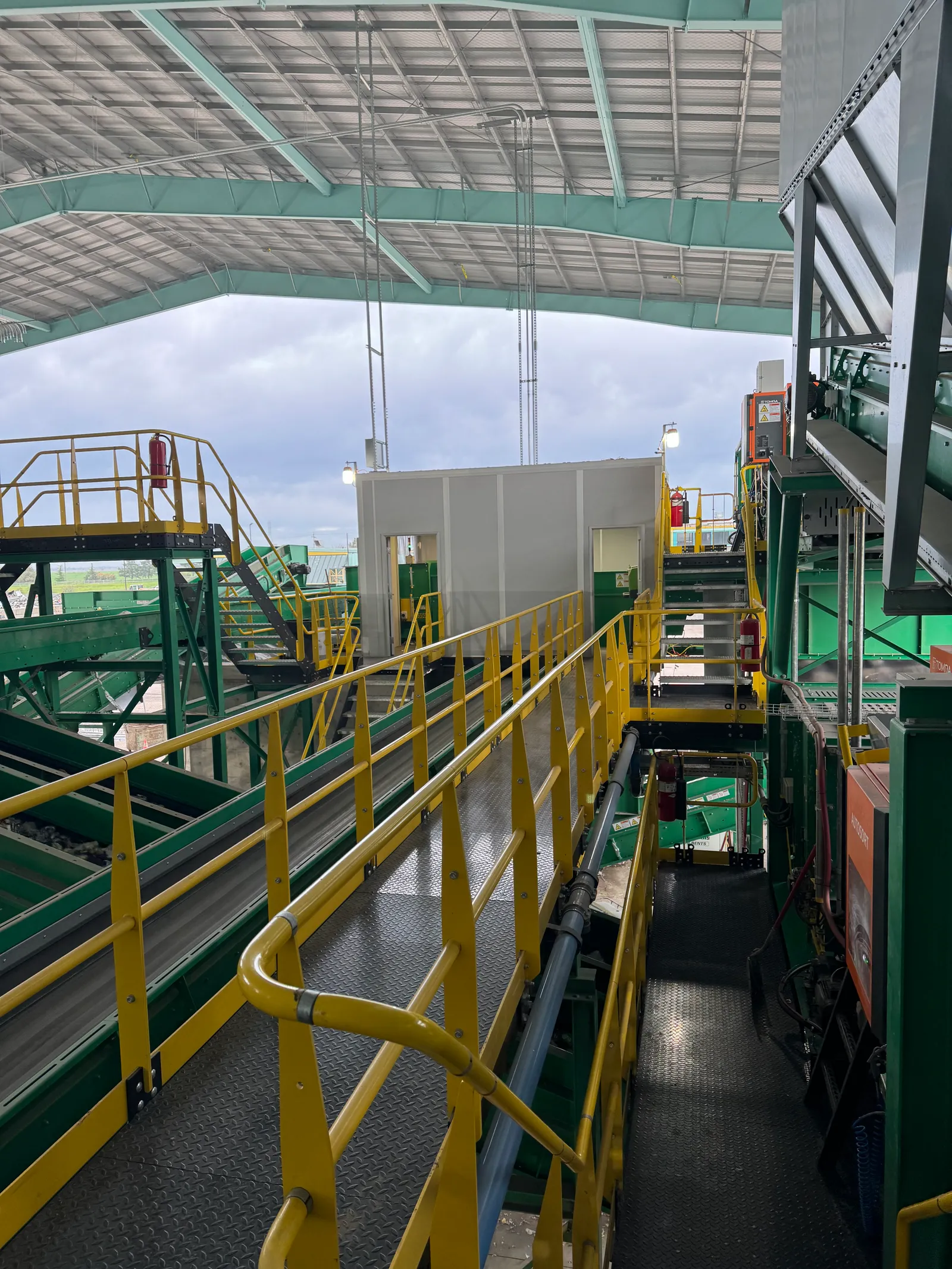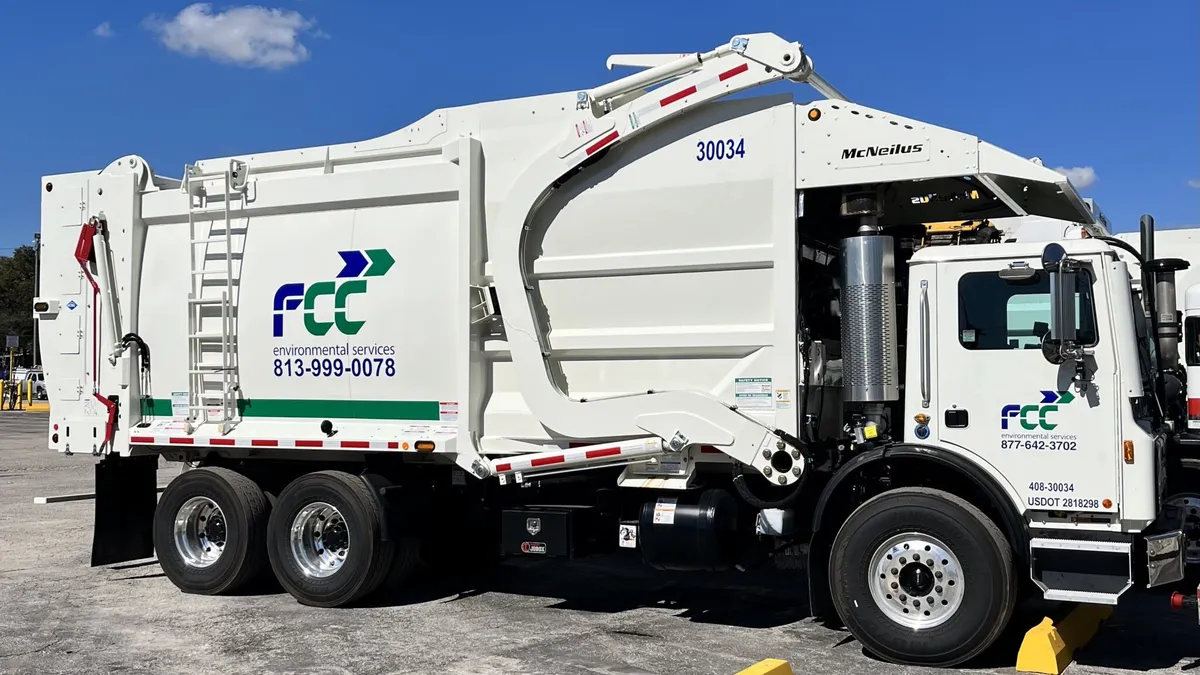Dive Brief:
- FCC Environmental Services restructured this year to support further scale, creating eastern and western regions and naming two regional vice presidents. The eastern region includes operations in Florida, but is also designed to support future East Coast growth.
- This follows three recent Florida contract wins that could potentially be worth an estimated $1.75 billion dollars — when factoring in possible extensions — for certain customers in Sarasota County, Clay County and St. Johns County.
- A pending contract in Minnesota, marks a future opportunity in the company’s western region — which currently includes operations in California, Nebraska and Texas. St. Paul recently announced plans to begin final negotiations with FCC for a residential contract of unspecified value.
Dive Insight:
FCC, a division of the Spain-based FCC Group, has scaled in the U.S. through a focus on municipal contracts and recycling facility opportunities.
The FCC Group recently reported revenue of over 9 billion euros for 2023, noting growth in its FCC Medio Ambiente division which provides environmental services in the U.S., U.K. and Spain. Specific revenue is not reported for the U.S., but FCC Environmental describes itself as among the fifteen largest companies in the U.S. waste industry.
Chief Operating Officer Dan Brazil said the company’s recent structure change was designed “to position ourselves for further and future growth” as the company is “anticipating expansion along the East Coast” in the coming years.
The Florida contract wins build on an existing presence in the state that dates back to some of FCC’s earliest contract awards in the U.S. These latest contracts, according to Brazil, help build the company’s footprint in the northern and western parts of the state.
The St. Johns County contract, which covers an estimated 300,000 residents, is currently serviced by WM and Republic Services. FCC plans to establish a new collection yard in St. Augustine, including a $40 million investment that involves 60 compressed natural gas trucks, ahead of an August start date. The Clay County contract, covering an estimated 230,000 residents, is served by WM. It begins in October and the company will establish a new site in Jacksonville to service it.
Sarasota County’s contract, which covers 250,000 residents and 2,000 commercial businesses in the southern part of the county, starts in March 2025. This will entail a new location in Venice, with an estimated $45 million investment that includes 65 CNG vehicles. Waste Pro won the contract for the northern portion of the county. WM currently services the contract.
Other possible opportunities in FCC’s eastern region include a contract in Orange County, Florida, to construct a new MRF. Bids were submitted in November and a decision is pending. FCC also responded to a collection RFP in Buncombe County, North Carolina, where Waste Pro is the current hauler.

In its western region — which includes multiple MRFs and contracts in Texas, as well as a contract in Omaha — FCC is advancing plans for a contract it started in Placer County, California, in 2022. The contract with the Western Placer Waste Management Authority involves constructing and operating multiple facilities. Brazil said that FCC recently completed commissioning of a C&D MRF and a retrofit of an existing mixed waste MRF is on track to wrap this year. FCC doesn’t have any other pending expansions in California at this time.
The company also aims to grow its western region footprint with a pending contract to collect residential garbage, bulky and yard waste for certain categories of buildings in St. Paul. This material is currently handled by a consortium of haulers (including WM and Republic Services) that was formed in 2018. Mayor Melvin Carter recently touted the planned contract switch as a way to address concerns about service levels. Nonprofit operator Eureka Recycling has also been selected to continue providing recycling collection service.
In a shift from its current arrangement, the city plans to take on an estimated 10% of collection work itself. During a March 6 meeting of the St. Paul City Council, Public Works Director Sean Kershaw said “the city doing this will allow us to take on some of the most difficult routes or the difficult alleys.” Councilors approved the agency’s request to procure enough trucks to begin service by April 2025, because as Kershaw noted: “the lead time on ordering garbage trucks is significant.”
An estimated 60% of the accounts in St. Paul involve some form of alley collection, and the city does not plow these areas. Brazil said Minnesota “has always been a tough market for municipal services” but noted FCC has experience with alley collection in Europe, as well as in Omaha where snow is also a factor. The company plans to equip one or two smaller vehicles, such as a cart delivery truck, with a plow and salt spreader to manage road conditions as needed.
Following final negotiations, the council is expected to vote on the collection contracts this spring. FCC’s other recent bids on municipal contracts in Iowa and Minnesota have not been successful, but it sees potential to grow from a base in St. Paul.
“This will really expand our Midwest presence. That was always our goal from winning the City of Omaha contract,” said Brazil. "There's a lot of other municipal targets around the Twin Cities area that we'll definitely be considering.”
Additionally, FCC could be looking to grow its commercial footprint through further acquisitions after only doing a handful in the U.S. to date. Funding for this and other initiatives could be boosted by an estimated $1.5 billion (Canadian) investment made by the Canada Pension Plan Investment Board in FCC Medio Ambiente last year for a 24.99% stake.














